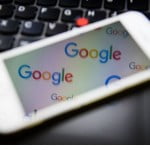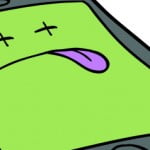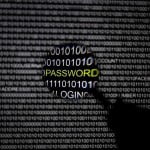
Winning Final Frontier “tricorder” team consists of Harris family members, including brothers (left to right) George, Basil and Gus.
XPRIZE
A half-century ago, the television series Star Trek introduced the world to the idea of a handheld device called a tricorder. It had a range of functions, including medical ones. For example, it easily diagnosed injuries and disease in the Starfleet crew. Now, aspects of this science fiction invention are becoming reality. A device called DxtER has just won a multi-million-dollar competition. One day soon, the winners hope, such a tricorder-like device might become part of regular home health care — much like a medical thermometer is today.
In 2012, the XPRIZE Foundation and Qualcomm, a technology company, issued a challenge to inventors: Build the best real-world tricorder and you might just take home millions of dollars. The idea was to create some device that could help people diagnose ails from home. This would be particularly useful for those living in remote parts of the world with no easy access to doctors.
Contest rules were straightforward. The device had to weigh 2.3 kilograms (5 pounds) or less. It had to be user-friendly. And it needed to diagnose 13 different conditions correctly. These included whooping cough, high blood pressure and skin cancer.
Six hundred teams entered when the contest began in 2013! A series of reviews whittled that down to just two finalists last December. Earlier this year, researchers at the University of California, San Diego, studied the two devices. They tested the accuracy of each on patients in California.
On April 12 the two teams of finalists were invited to Hollywood, Calif. On a stage before a crowd, neither group knew who had won. “They would tell us nothing,” says Basil Harris. “It was nerve-wracking.”
Himself a doctor, Basil works in an emergency room near Philadelphia, Penn. He and his brother George led their family’s team. They named their invention DxtER. “Dx” is shorthand for diagnosis. “T” stands for tricorder. “ER” refers to where Basil Harris works.
Finally, the winner was announced: the Harris family’s team, Final Frontier. It received $2.6 million in prize money. Second place Dynamical Biomarkers Group, from Taiwan, took home $1 million.
Each winning device can fit inside a small box. DxtER is a collection of smaller gadgets. They include a small component that slides over a person’s finger to measure pulse, blood oxygen levels and blood sugar levels. There’s also a tube that analyzes a person’s breath, and a small round device that can be held to a person’s forehead to record temperature. Users can interact with DxtER’s devices through a tablet computer.
The system that took second place interacts wirelessly with a person’s smartphone. Using an app, people can run specific tests on themselves. It also contains sensors for sampling blood and measuring vital signs (such as temperature and blood pressure).
The Final Frontier team is a family affair. In addition to Basil and George, it also includes other Harris siblings and their children. “We’ve been working on it for so long, I don’t know if [my children] remember normal life before building tricorders in the kitchen,” says Basil.
The next step is to get the devices to people who need them. “This is when the hard work really begins,” he says. “The last five years have been all fun and games.”
Researchers in California and elsewhere have started clinical trials — patient studies — designed to ensure every part of the tricorders is safe and accurate. One of those trials even involves patients at hospitals where Basil Harris works. Both of the winning devices will be tested. If these human trials are successful, the companies will get to apply for their device’s approval from the U.S. Food and Drug Administration. This government agency makes sure that medicines and medical devices work as claimed and also benefit consumers. Only then can either of the tricorders be sold to the public.
Harris says his team also will look for ways to make DxtER smaller as the device undergoes tests. “Right now, it’s a bulky, Frankenstein thing,” he says. “Hopefully, as we advance the electronics, we can whittle it down to watch size.”
Power Words
(for more about Power Words, click here)
app Short for application, or a computer program designed for a specific task.
blood pressure The force exerted against vessel walls by blood moving through the body. Usually this pressure refers to blood moving specifically through the body’s arteries. That pressure allows blood to circulate to our heads and keeps the fluid moving so that it can deliver oxygen to all tissues. Blood pressure can vary based on physical activity and the body’s position. High blood pressure can put someone at risk for heart attacks or stroke. Low blood pressure may leave people dizzy, or faint, as the pressure becomes too low to supply enough blood to the brain.
blood sugar The body circulates glucose, a type of simple sugar, in blood to tissues of the body where it is used as a fuel. The body extracts this simple sugar from breakdown of sugars and starches. However, some diseases, most notably diabetes, can allow an unhealthy concentration of this sugar to build up in blood.
cancer Any of more than 100 different diseases, each characterized by the rapid, uncontrolled growth of abnormal cells. The development and growth of cancers, also known as malignancies, can lead to tumors, pain and death.
clinical trial A research trial that involves people.
component An item that is part of something else, such as pieces that go on an electronic circuit board.
diagnose To analyze clues or symptoms in the search for their cause. The conclusion usually results in a diagnosis — identification of the causal problem or disease.
electronics Devices that are powered by electricity but whose properties are controlled by the semiconductors or other circuitry that channel or gate the movement of electric charges.
ER Abbreviation for emergency room, that part of the hospital where doctors initially attend to the immediate medical needs of accident victims and others who need critical care.
Food and Drug Administration (or FDA) A part of the U.S. Department of Health and Human Services, FDA is charged with overseeing the safety of many products. For instance, it is responsible for making sure drugs are properly labeled, safe and effective; that cosmetics and food supplements are safe and properly labeled; and that tobacco products are regulated.
science fiction A field of literary or filmed stories that take place against a backdrop of fantasy, usually based on speculations about how science and engineering will direct developments in the distant future. The plots in many of these stories focus on space travel, exaggerated changes attributed to evolution or life in (or on) alien worlds.
sensor A device that picks up information on physical or chemical conditions — such as temperature, barometric pressure, salinity, humidity, pH, light intensity or radiation — and stores or broadcasts that information. Scientists and engineers often rely on sensors to inform them of conditions that may change over time or that exist far from where a researcher can measure them directly.
sibling An offspring that shares the same parents (with its brother or sister).
smartphone A cell (or mobile) phone that can perform a host of functions, including search for information on the internet.
technology The application of scientific knowledge for practical purposes, especially in industry — or the devices, processes and systems that result from those efforts.
[“Source-sciencenewsforstudents”]











